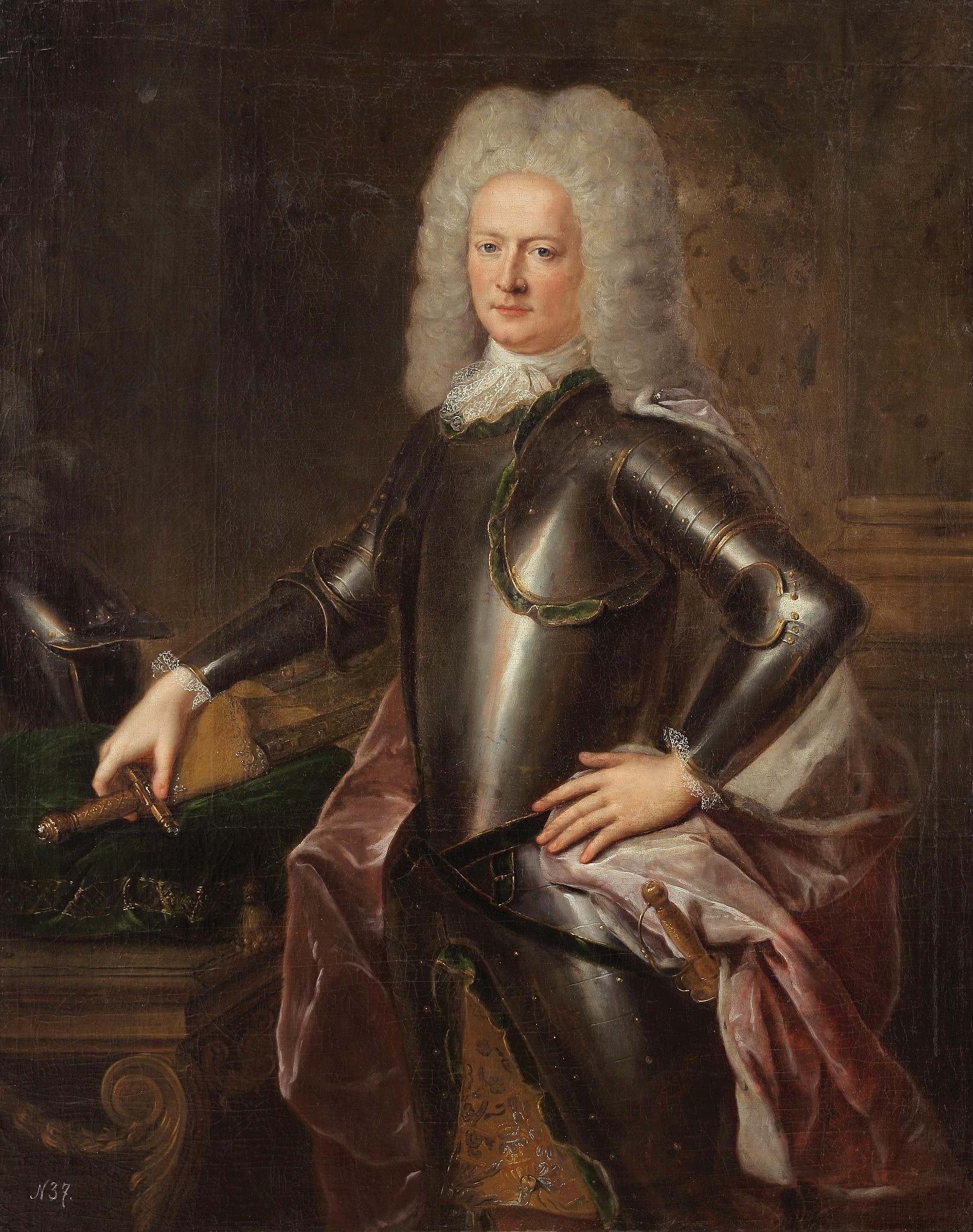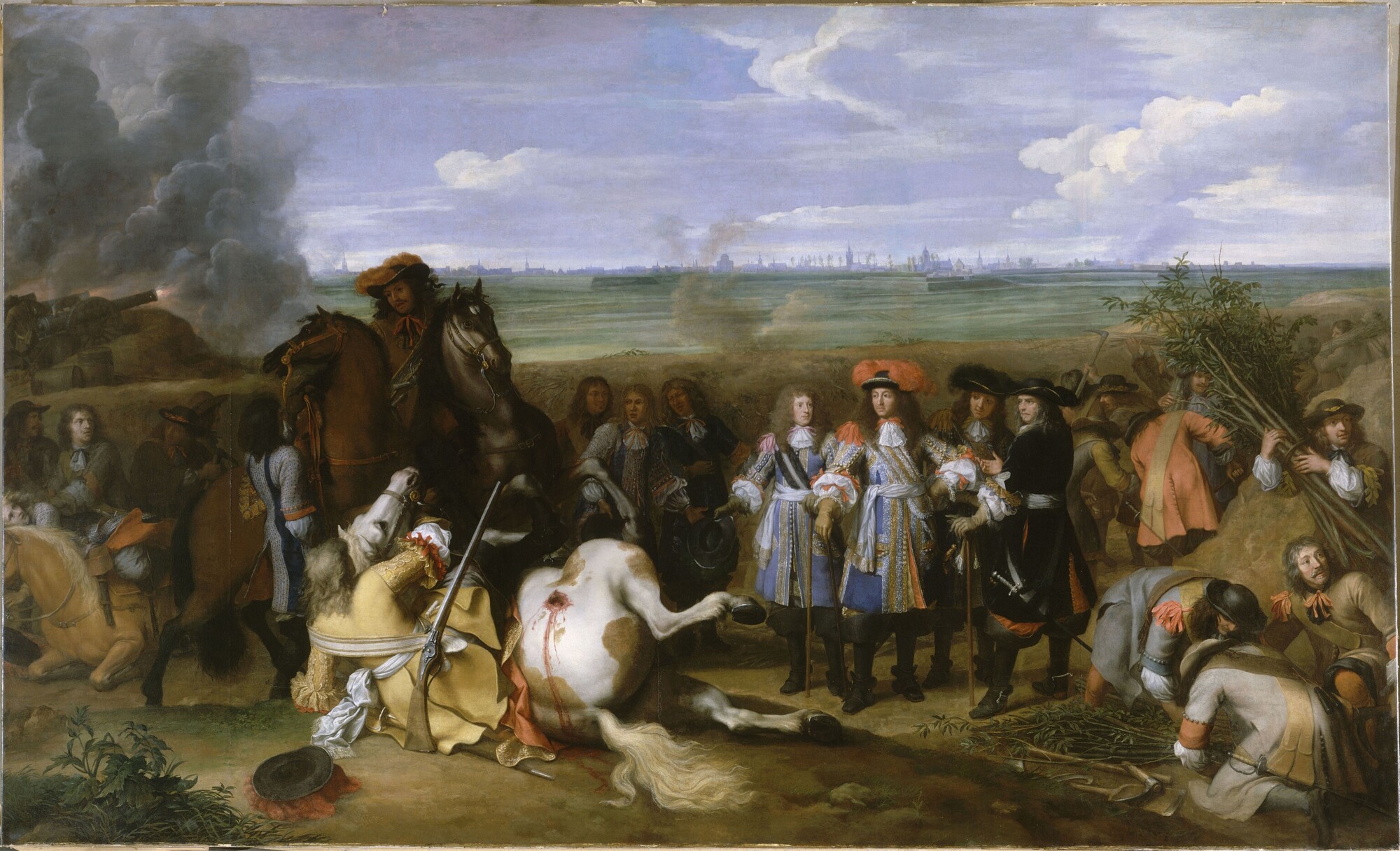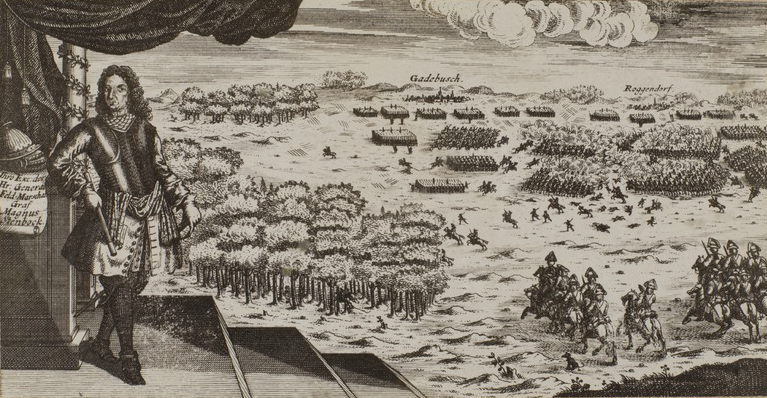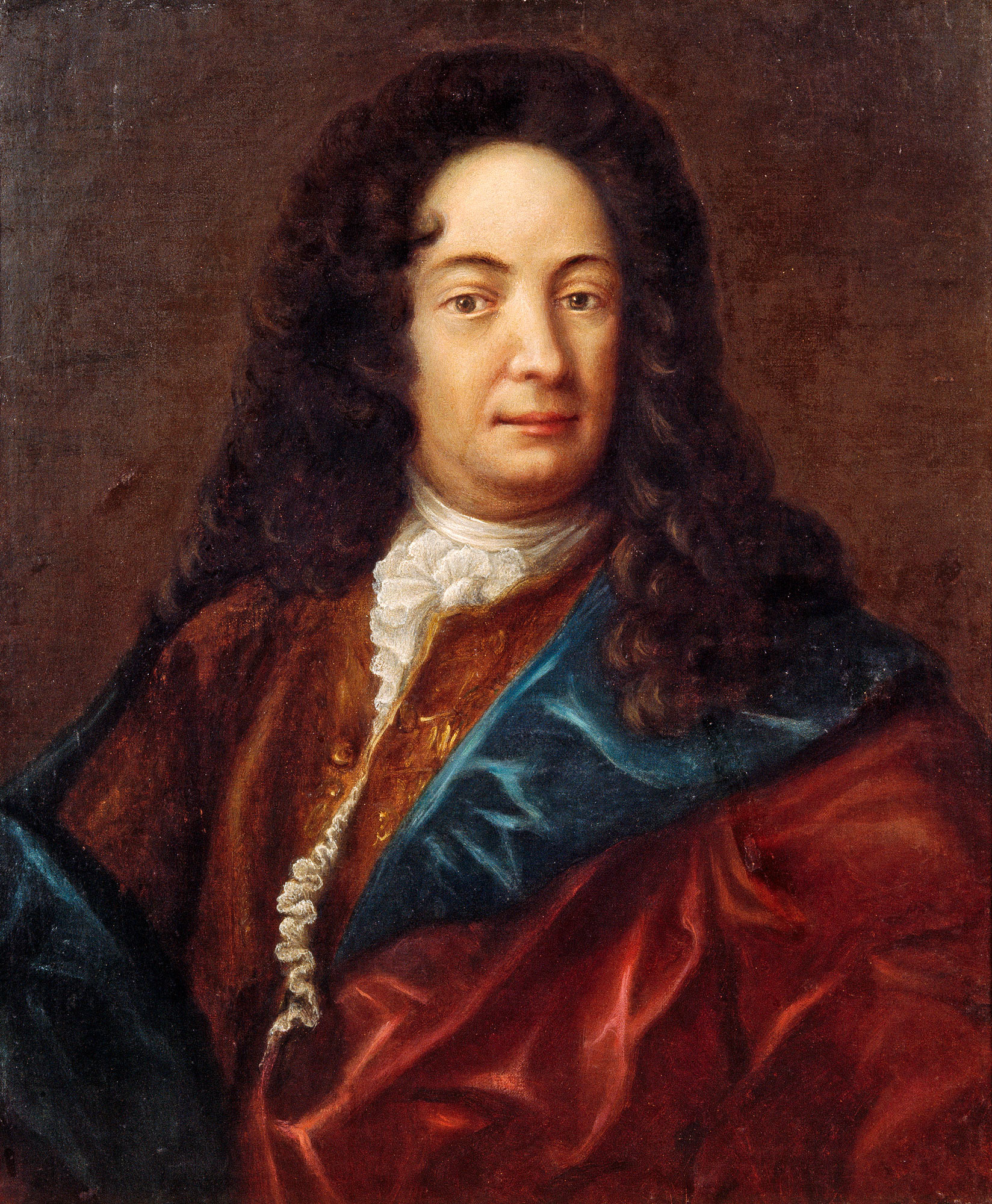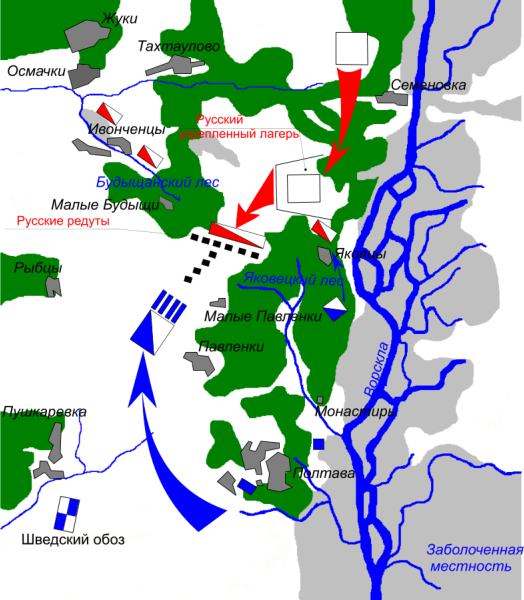|
Jacob Heinrich Von Flemming
Jakob Heinrich von Flemming (3 March 1667 – 30 April 1728) was a Saxon count, military officer and politician. He was born in Hoff, Prussian Province of Pomerania to a noble family. He completed his law studies in 1688, after which he entered service with Brandenburg. He attained the rank of general in 1705 and Generalfeldmarschall in 1711. He was appointed ambassador to Warsaw by elector Frederick Augustus of Saxony, who aspired to the throne of Poland–Lithuania which had been vacant since the death of Jan III Sobieski in 1696. By causing competition between the other aspirants, Flemming was able to secure the election of the elector as Augustus II of Poland–Lithuania. Flemming participated in the Livonian campaign of the Great Northern War. His troops captured the fort Düna fort at Riga from the Swedes in 1700, renaming it "Augustenburg" ("August's fort"), but the Swedes defeated the allied Russian-Saxon army at the crossing of the Daugava in 1701. During the B ... [...More Info...] [...Related Items...] OR: [Wikipedia] [Google] [Baidu] |
Jokūbas Henrikas Flemingas
Jokūbas is a Lithuanian language, Lithuanian masculine given name. It is a cognate of the given names Jacob and James (name), James and may refer to: *Edvardas Jokūbas Daukša (1836–1890), Lithuanian poet, translator, participant of 1863 Uprising *Jokūbas Gintvainis (born 1994), Lithuanian basketball player *Jokūbas Minkevičius (1921–1996), Lithuanian politician *Jokūbas Šernas (1888–1926), Lithuanian attorney, journalist, teacher, and banker *Yakov Smushkevich, Jokūbas Smuškevičius (1902–1941), Soviet-Lithuanian Commander of the Soviet Air Force *Jakub Wygodzki, Jokūbas Vygodskis (aka, Jakub Wygodzki) (1856–1941), Polish–Lithuanian Jewish politician, Zionist activist, and a medical doctor References {{given name Lithuanian masculine given names ... [...More Info...] [...Related Items...] OR: [Wikipedia] [Google] [Baidu] |
Battle Of Kliszów
The Battle of Kliszów (also spelled Klissow or Klezow) took place on July 19, 1702, near Kliszów in the Polish–Lithuanian Commonwealth during the Great Northern War. A numerically superior Polish–Saxon army led by king Augustus II the Strong was defeated by a Swedish army half its size under the command of king Charles XII of Sweden. During the second year of the war, following the Swedish victories at Narva and Düna, Charles XII launched a campaign against the Polish-Lithuanian Commonwealth. His aim was to outmaneuver Augustus II's Saxon troops and create dissension in the Polish–Lithuanian Commonwealth to depose Augustus II as king of Poland. In May 1702, Charles XII captured the capital of Warsaw. While there, the Swedish king received intelligence about Augustus II being in Kraków and assembling a large Saxon army. He chose to pursue Augustus II and called for Swedish reinforcements in order to assemble an army capable of defeating the Saxon army in a decisive b ... [...More Info...] [...Related Items...] OR: [Wikipedia] [Google] [Baidu] |
1728 Deaths
Seventeen or 17 may refer to: *17 (number), the natural number following 16 and preceding 18 * one of the years 17 BC, AD 17, 1917, 2017 Literature Magazines * ''Seventeen'' (American magazine), an American magazine * ''Seventeen'' (Japanese magazine), a Japanese magazine Novels * ''Seventeen'' (Tarkington novel), a 1916 novel by Booth Tarkington *''Seventeen'' (''Sebuntiin''), a 1961 novel by Kenzaburō Ōe * ''Seventeen'' (Serafin novel), a 2004 novel by Shan Serafin Stage and screen Film * ''Seventeen'' (1916 film), an American silent comedy film *'' Number Seventeen'', a 1932 film directed by Alfred Hitchcock * ''Seventeen'' (1940 film), an American comedy film *'' Eric Soya's '17''' (Danish: ''Sytten''), a 1965 Danish comedy film * ''Seventeen'' (1985 film), a documentary film * ''17 Again'' (film), a 2009 film whose working title was ''17'' * ''Seventeen'' (2019 film), a Spanish drama film Television * ''Seventeen'' (TV drama), a 1994 UK dramatic short starring C ... [...More Info...] [...Related Items...] OR: [Wikipedia] [Google] [Baidu] |
1667 Births
Events January–March * January 11 – Aurangzeb, monarch of the Mughal Empire, orders the removal of Rao Karan Singh as Maharaja of the Bikaner State (part of the modern-day Rajasthan state of India) because of Karan's dereliction of duty in battle. * January 19 – The town of Anzonico in Switzerland is destroyed by an avalanche. * January 27 – The 2,000 seat Opernhaus am Taschenberg, a theater in Dresden (capital of the Electorate of Saxony) opens with its first production, Pietro Ziani's opera ''Il teseo''. * February 5 – In the Second Anglo-Dutch War, the English Royal Navy warship HMS ''Saint Patrick'' is captured less than nine months after being launched, when it fights a battle off the coast of England and North Foreland, Kent. Captain Robert Saunders and 8 of his crew are killed while fighting the Dutch ships ''Delft'' and ''Shakerlo''. The Dutch Navy renames the ship the ''Zwanenburg''. * February 6 (January 27 O.S.) – The ... [...More Info...] [...Related Items...] OR: [Wikipedia] [Google] [Baidu] |
Tarnogród Confederation
The Tarnogród Confederation was a confederation of szlachta in Polish–Lithuanian Commonwealth, in the years 1715–1716. It was formed on 26 November 1715 in Tarnogród by nobility angered by illegal taxation, levied for Saxon forces operating in Grand Duchy of Lithuania on behalf of Augustus II the Strong, who wanted to introduce absolute monarchy in the Commonwealth. Its marshal was Stanisław Ledóchowski. The confederates and the royal forces did not fight any decisive battles, but they fought numerous smaller skirmishes; several towns and castles were taken. The ensuing negotiations eventually brought Peter I of Russia and Russian Empire forces into the Commonwealth "for peacekeeping and mediation". This event marked the beginning of lasting Russian Empire influence on Commonwealth internal affairs, starting with the Silent Sejm of 1717. Background Augustus II the Strong of the Saxony's House of Wettin was elected to the throne of Poland in 1697. The Wettins, used to abs ... [...More Info...] [...Related Items...] OR: [Wikipedia] [Google] [Baidu] |
Battle Of Gadebusch
The Battle of Gadebusch or Wakenstädt (20 December 1712) was Sweden's final great victory in the Great Northern War. It was fought by the Swedes to prevent the loss of the city of Stralsund to Danish and Saxon forces. Prelude During 1712, all of Sweden's dominions south of the Baltic Sea, apart from forts, had been conquered by the allies Denmark, Saxony, and Russia. In the Baltic the Danish admiral Gyldenløve patrolled with a squadron to disrupt Swedish supply lines to the Continent. It was vital for Sweden not to lose Stralsund, as it was the gateway to campaigns in Poland. While a Danish army moved in the region of Hamburg, a large Russian-Saxon force stood south of Stralsund. Stenbock could hardly attack this force with a frontal assault, but hoped that by moving west towards Mecklenburg it could be encircled or scattered. Such a movement would also prevent the joining of the two allied forces. The Danish army under Frederick IV of Denmark was led by general Jobst ... [...More Info...] [...Related Items...] OR: [Wikipedia] [Google] [Baidu] |
Siege Of Tönning
During the Great Northern War, the fortress of Tönning (Tønning) in the territory of Holstein-Gottorp, an ally of the Swedish Empire, was besieged twice. Denmark-Norway was forced to lift the first siege in 1700, but a combined force of the anti-Swedish coalition successfully besieged and took Tönning in 1713–1714. 1700 The first siege was one of the first military actions of the Great Northern War. Denmark-Norway, Saxe- Poland-Lithuania and Russia had agreed on invading the Swedish Empire on three fronts, and accordingly, Danish forces moved into Holstein-Gottorp,Frost (2000), p.228 allied and dynastically tied to Sweden,Frost (2000), p.227 and laid siege to Tönning in March 1700. The siege had to be lifted when Charles XII of Sweden, backed by the Maritime Powers, in a surprise move deployed an army in front of Copenhagen, forcing Frederik IV of Denmark-Norway out of the war by the Peace of Travendal on 18 August 1700.Frost (2000), p.229 Denmark re-entered the war o ... [...More Info...] [...Related Items...] OR: [Wikipedia] [Google] [Baidu] |
Siege Of Stralsund (1711–1715)
The siege of Stralsund was a battle during the Great Northern War. The Swedish Empire defended her Swedish Pomeranian port of Stralsund against a coalition of Denmark-Norway, the Electorate of Saxony and the Tsardom of Russia, which was joined by the Kingdom of Prussia during the siege. A first attempt to take Stralsund was made in 1711, when the allies closed in on the town. Swedish relief forced the coalition to withdraw from the fortifications, whereupon the besieging armies drew a wider ring along the lines of the Recknitz and Peene rivers. Magnus Stenbock's victory at Gadebusch for a short time distracted the allies, but after Stenbock's pursuit and subsequent defeat, Prussia as well as Hanover, ruled in personal union with Great Britain, joined the anti-Swedish alliance. The allies agreed that Denmark should cede her claims to Bremen-Verden to Hanover, and in turn Denmark was promised the northern parts of Swedish Pomerania with Stralsund, while the southern par ... [...More Info...] [...Related Items...] OR: [Wikipedia] [Google] [Baidu] |
Magnus Stenbock
Count Magnus Stenbock (22 May 1665 – 23 February 1717) was a Swedish field marshal ('' Fältmarskalk'') and Royal Councillor. A renowned commander of the Carolean Army during the Great Northern War, he was a prominent member of the Stenbock family. He studied at Uppsala University and joined the Swedish Army during the Nine Years' War, where he participated in the Battle of Fleurus in 1690. After the battle, he was appointed lieutenant colonel, entered Holy Roman service as Adjutant General, and married Eva Magdalena Oxenstierna, daughter of statesman Bengt Gabrielsson Oxenstierna. Returning to Swedish service he received colonelcy of a regiment in Wismar, and later became colonel of the Kalmar and then Dalarna regiments. During the Great Northern War, Stenbock served under King Charles XII in his military campaigns in the Baltic and Polish fronts. As director of the General War Commissariat, Stenbock collected substantial funds and supplies for the maintenance of th ... [...More Info...] [...Related Items...] OR: [Wikipedia] [Google] [Baidu] |
Dresden
Dresden (, ; Upper Saxon: ''Dräsdn''; wen, label= Upper Sorbian, Drježdźany) is the capital city of the German state of Saxony and its second most populous city, after Leipzig. It is the 12th most populous city of Germany, the fourth largest by area (after Berlin, Hamburg and Cologne), and the third most populous city in the area of former East Germany, after Berlin and Leipzig. Dresden's urban area comprises the towns of Freital, Pirna, Radebeul, Meissen, Coswig, Radeberg and Heidenau and has around 790,000 inhabitants. The Dresden metropolitan area has approximately 1.34 million inhabitants. Dresden is the second largest city on the River Elbe after Hamburg. Most of the city's population lives in the Elbe Valley, but a large, albeit very sparsely populated area of the city east of the Elbe lies in the West Lusatian Hill Country and Uplands (the westernmost part of the Sudetes) and thus in Lusatia. Many boroughs west of the Elbe lie in the foreland of the ... [...More Info...] [...Related Items...] OR: [Wikipedia] [Google] [Baidu] |
Battle Of Poltava
The Battle of Poltava; russian: Полта́вская би́тва; uk, Полта́вська би́тва (8 July 1709) was the decisive and largest battle of the Great Northern War. A Russian army under the command of Tsar Peter I defeated a Swedish army, under the command of Carl Gustaf Rehnskiöld. The battle put an end to the status of the Swedish Empire as a European great power, as well as its eastbound expansion, and marked the beginning of Russian hegemony in Northern Europe. During the course of six years in the initial stages of the war, King Charles XII and the Swedish Empire had defeated almost all participants in the anti-Swedish coalition, which initially consisted of the Polish-Lithuanian Commonwealth, Denmark-Norway and the Tsardom of Russia. The latter under Tsar Peter I's rule was the only one still undefeated. Charles XII therefore chose to invade Russia in the autumn of 1707 and march towards Moscow with a large Swedish army. However, the campaign ... [...More Info...] [...Related Items...] OR: [Wikipedia] [Google] [Baidu] |
Swedish Pomerania
Swedish Pomerania ( sv, Svenska Pommern; german: Schwedisch-Pommern) was a dominion under the Swedish Crown from 1630 to 1815 on what is now the Baltic coast of Germany and Poland. Following the Polish War and the Thirty Years' War, Sweden held extensive control over the lands on the southern Baltic coast, including Pomerania and parts of Livonia and Prussia (''dominium maris baltici''). Sweden, which had been present in Pomerania with a garrison at Stralsund since 1628, gained effective control of the Duchy of Pomerania with the Treaty of Stettin in 1630. At the Peace of Westphalia in 1648 and the Treaty of Stettin in 1653, Sweden received Western Pomerania (German ''Vorpommern''), with the islands of Rügen, Usedom, and Wolin, and a strip of Farther Pomerania (''Hinterpommern''). The peace treaties were negotiated while the Swedish queen Christina was a minor, and the Swedish Empire was governed by members of the high aristocracy. As a consequence, Pomerania was not anne ... [...More Info...] [...Related Items...] OR: [Wikipedia] [Google] [Baidu] |
